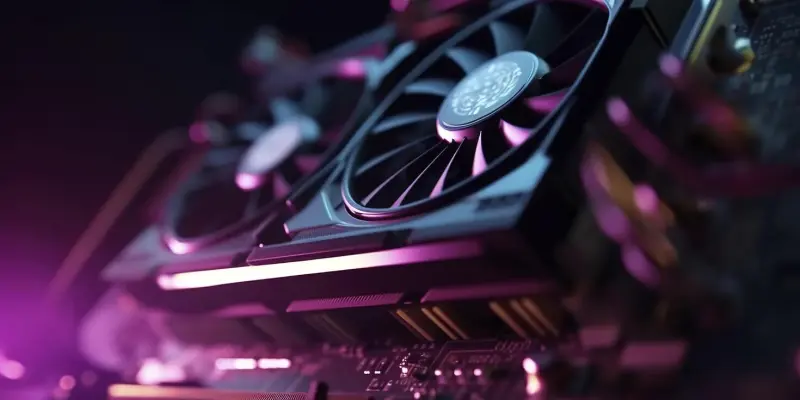The rapid advancement of artificial intelligence (AI) and powerful graphics processing units (GPUs) has spurred a significant need for effective thermal management solutions. Accelsius, a liquid cooling firm, has introduced an innovative cooling technology designed to handle high-power components generating up to 4,500 watts of power, effectively addressing these growing thermal challenges.
Demonstrations of Cooling Capabilities
Powerful GPU Cooling
Accelsius has successfully showcased its advanced cooling technology through a series of demonstrations. The first test involved a GPU socket-representative thermal test vehicle, where the cold plate reached an impressive 4,500W. This achievement was constrained only by the power limit of the test setup, not the cooling system itself, highlighting the strength and efficiency of Accelsius’ approach. This method is crucial for handling the increasing thermal loads generated by modern GPUs, especially as industry standards continue to rise.
Efficient AI Server Rack Cooling
In the second demonstration, Accelsius focused on cooling a massive 250kW AI server rack equipped with Nvidia #00 servers. Utilizing two-phase cold plates, the company managed to keep the GPU temperatures below Nvidia’s thermal throttle limit, even with inlet water temperatures up to 40°C. This test underscores the reliability and effectiveness of Accelsius’ cooling solution in real-world applications, ensuring that AI servers can operate at peak performance without overheating.
Scaling for Future Needs
Meeting Current and Future Standards
Dr. Richard Bonner, CTO of Accelsius, emphasized the company’s readiness to meet current performance standards and scale up for future requirements. The firm’s cooling technology is prepared to handle even more demanding setups, including 600kW racks and 4,500W TDP sockets. This capability is vital as newer chips from industry giants like Nvidia and AMD operate at significantly higher thermal design power (TDP) ratings, where traditional air cooling methods fall short.
Advanced Refrigerant System
Accelsius utilizes a closed-loop system with dielectric refrigerant, offering much greater heat removal efficiency compared to conventional water-cooling systems. This innovation ensures that high-power chips can be cooled effectively, sustaining their performance over extended periods and preventing thermal throttling, which can degrade computational speed and efficiency.
Industry Collaboration and Expansion
NeuCool Technology Showcase
In its pursuit of excellence, Accelsius partnered with Computacenter to present its NeuCool technology in Computacenter’s HyperScale Integration Center located in the UK. Customers now have the opportunity to experience NeuCool’s capabilities firsthand, reinforcing Accelsius’ European expansion goals. Developed initially by Bell Labs and commercialized by Accelsius, NeuCool employs evaporators mounted directly on hotspot chips. These evaporators use dielectric refrigerant that boils and condenses in a loop, thereby efficiently cooling the components.
Foundation and Progress
Founded by Innventure LLC in Texas in 2022, Accelsius has consistently pushed the boundaries of cooling solutions for AI and high-density computing. The company’s innovations represent a notable evolution in thermal management. By providing scalable, efficient, and accessible cooling technologies, Accelsius meets the demands of increasingly powerful computing hardware. This strategic shift prioritizes ease of deployment and hands-on user experience, ensuring that complex systems are cooled without compromising performance.
Future Considerations and Advancements
Ongoing Innovation
As the landscape of high-power computing continues to evolve, Accelsius remains at the forefront of thermal management solutions. Its innovative approaches are essential in preventing overheating, which can significantly impact the longevity and efficiency of advanced computing systems. With the rise of AI and high-capacity GPUs, effective cooling technologies become indispensable, making Accelsius’ contributions critical to the industry.
Potential Applications
As artificial intelligence (AI) continues to advance rapidly, the demand for more effective thermal management solutions has soared alongside the increasing power of graphics processing units (GPUs). Traditional cooling methods, such as air cooling, are quickly becoming insufficient to handle the heat generated by these high-power devices. Recognizing this urgent need, Accelsius, a liquid cooling company, has unveiled a groundbreaking cooling technology. This innovative solution is specifically engineered to manage high-power components that can generate up to 4,500 watts of power, effectively tackling the burgeoning thermal challenges faced by modern technology. Accelsius’s introduction of this advanced cooling system marks a significant step forward in thermal management, ensuring that powerful AI processors and GPUs can operate efficiently without overheating. This development is crucial as it not only enhances the performance and longevity of these components but also supports the continual evolution and implementation of AI technologies in various industries.

